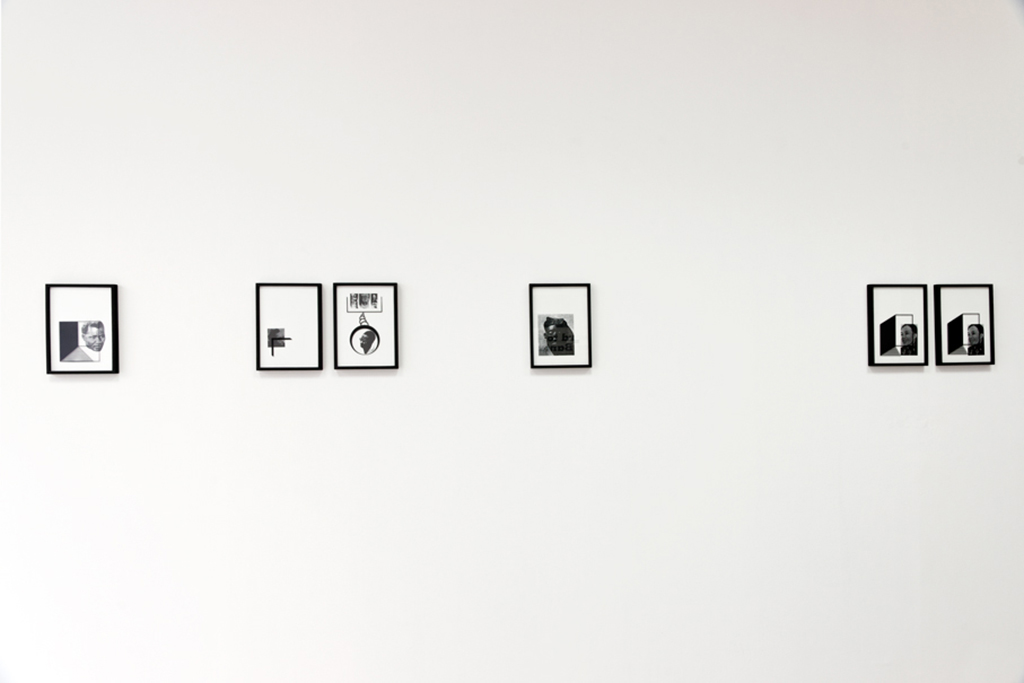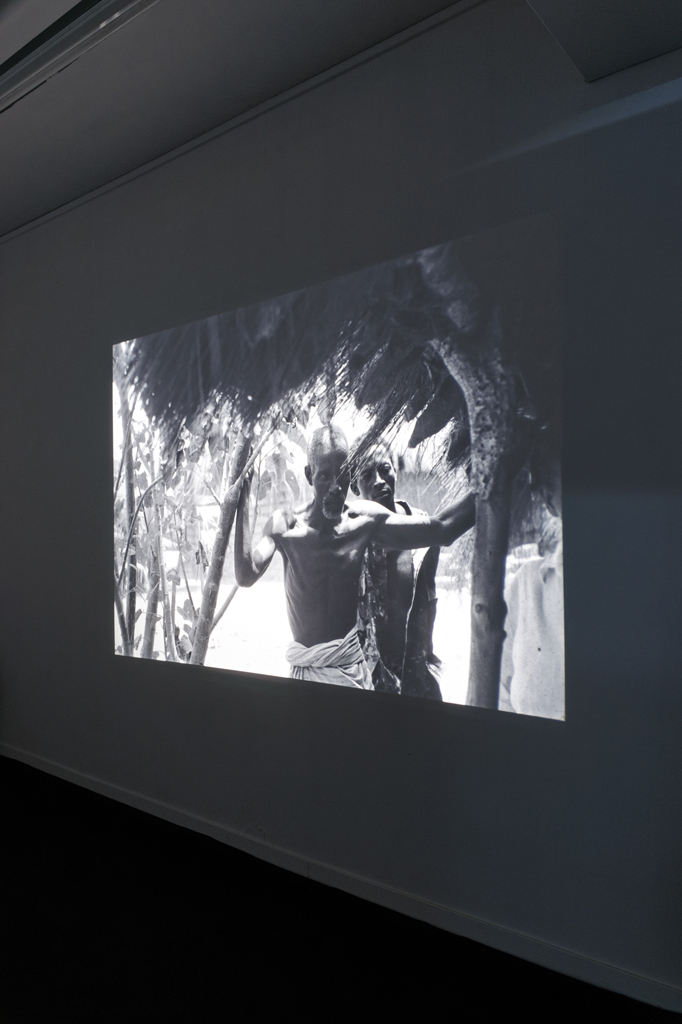
A minor sense of didacticism
Mathieu Kleyebe Abonnenc
28.05.2011 - 30.07.2011, vernissage 27.05.2011

Communiqué de presse en français plus bas
Mathieu Kleyebe Abonnenc's research has taken an exciting new turn since last year. The figure of the colonized (and that of the colonizer) doesn't hide in void spaces any more, or in filmed representations of agonizing worlds. This researchlinked to the construction of a post-colonial identity and the formal work that stems from it, now create new possibilities. One of these possibilities consists in thinking in terms of collective work, an efficient system to fight erasure and disparition.
When preparing an exhibition, we try to foresee practical details, and we get ready to receive a group of works that we like to imagine, whose future presence we expect with pleasure. Through this process of projection, we come to realize that some of those projects intersect with our current desires and commitments. We look forward to their realisation because we know them to be necessary to the development of our thought process.
We were recently mentioning the importance of the exercise of a certain sense of responsibility, even?or rather especially in the context of the art world, which is often presented as autonomous. We are citizens: we live in a neighbourhood, a city, a country, a continent. As such, we think that it is possible for our program to let a dissonant voice be heard in a larger political debate set under biased terms. Mathieu Kleyebe Abonnenc's work positions itself under the auspices of important voices of decolonization, such as Frantz Fanon's, and in close relationship to actors of these conflicts, such as the Guadeloupian film director Sarah Maldoror. From this position, he proposes a minority reading of recent History.
A minor sense of didacticism is the occasion to "say it all again (...) all these names that were forgotten in the books, all the faded ones" (1). This helps to make sense of the film program Abonnenc presents in the gallery's basement: the same selection of movies (some of them confidential, most of them impossible to find) were projected in Algiers in 1986, for the 25th anniversary of Fanon's death. Those who attended Abonnenc's previous projects centered around the African-American composer Julius Eastman at Le Plateau / FRAC Ile de France (2) and around Sarah Maldoror at Manifesta 8 and at Gasworks (London), would have probably understood that he is working with time, through small brushstrokes that paint the portrait of a family he invents for himself, of a context he wants to create.
In the exhibition he curated at Synagogue de Delme in the spring of 2010, Self as disappearance, he sketched a conceptual background around identity issues to outline familiar works by Joe Scanlan or Haegue Yang. It was quite a challenge to do so in a country where any thought about identity issues either becomes a suspected "communitarian" claim or is used as a shield to protect an allegedly-threatened "national identity".
In a context that denies the possibility to take into account a different story which is always the Other's, not ours, not the right one Mathieu Abonnenc's voice joins forces with numerous women's (3) who could conveniently be placed into a so-called "feminist" sub-category of art history. The division into sub-categories an ancestral domination strategy allows some to think that universal art exists. By gathering together the muzzled actors and actresses of History (and of art history in particular), by participating to the writing of a common memory through exhibitions, translations of seminal texts, projections of forgotten films or reconstitutions of scattered archives (like the collection of the Tricontinental journal published by François Maspero or the images of the film Guns for Banta, by Sarah Maldoror), Abonnenc takes over the legacy of Fanon and of the nonaligned. It is not necessary to recall here recent national and international events in order to emphasize the necessity to make this contradictory thought persist in virtually-amnesic western societies.
IA
1 In L'aube des damnés (dir: Ahmed Rachedi, Algeria, 1965, 35 mm)
2 exhibition Watchmen, Liars, Dreamers, fall 2010 (cur: Guillaume Désanges)
3 He translated the text Choosing the margin as a place of radical openness by the African-American author bell hooks, to be published in the third issue of Petunia
To access the complete film program Images Fanon, 1987-2002, please click here
Mathieu Kleyebe Abonnenc was born in 1977. His work was recently presented at Manifesta 8 (Murcia, ES), Montehermoso (Vitoria, Spanish Basque Country), FRAC Lorraine (Metz, F) and at Musée d'Art Moderne de la Ville de Paris. A minor sense of didacticism comes after Foreword to Guns for Banta, a solo exhibition which took place at Gasworks, London (Feb-Apr 2011, cur. Anna Colin). Among his upcoming projects, two monographic presentations: the first at La Ferme du Buission, Noisiel, F (Orphelins de Fanon, 6.11.2011-31.01.2012, cur. Julie Pellegrin), and the second at Serralves, Porto (2012, cur. Ricardo Nicolau). An interview with the artist was published in the 4th issueMay (2010).
Very special thanks to : Sarah Maldoror, Les Instants Chavirés, La puce à l'oreille, Montreuil, Les années scooter, Paris, Valentine Carette, David Chaulier, Marie Cozette, Charlotte Moth, Guillaume Gilles, Sébastien Martins, Clément Rodzielski, Anny Romand, Guillaume Ségur, Gwenaëlle Simon.
The slideshow Foreword to Guns for Banta was produced thanks to the support of CNAP, Paris, Gasworks, London and Montehermoso, Vitoria.
La recherche de Mathieu Kleyebe Abonnenc a depuis un an pris un tournant décisif. La figure du colonisé (et celle du colonisateur) ne se cache plus dans des espaces suggérés par des vides ou dans les représentations filmées d'un monde à l'agonie. Cette recherche, liée à la construction d'une identité post-coloniale, et le travail formel qui en découle, créent de nouveaux possibles. Un de ces possibles consiste à penser une oeuvre collective?car il s'agit toujours d'échanges et de flux?qui puisse lutter efficacement contre l'effacement et la disparition.
Programmer une exposition, c'est envisager un certain nombre de paramètres pratiques, et se préparer à recevoir un ensemble d'oeuvres que l'on prend plaisir à imaginer, dont on se réjouit de la présence future. Au cours de ce processus de projection, certains de ces projets recoupent nos désirs et nos engagements. Ils nous rendent impatientes parce qu'on les sait nécessaires à l'approfondissement d'une réflexion en cours.
Nous évoquions il y a peu de temps l'importance d'un certain sens de la responsabilité, même (et surtout) dans le contexte souvent présenté comme autonome du monde de l'art. Nous sommes des citoyennes, nous vivons dans un quartier, une ville, un pays, un continent, et conscientes de cela, il ne nous semble pas inconcevable que notre programmation puisse porter une parole dissonante dans un débat politique aux termes mal posés. Placé sous l'égide de grandes voix de la décolonisation, comme celle de Frantz Fanon, ou aux côtés d'acteurs de ces conflits, comme la réalisatrice antillaise Sarah Maldoror, le travail de Mathieu Kleyebe Abonnenc propose une relecture minoritaire de l'Histoire récente.
A minor sense of didacticism est une occasion pour l'artiste de « tout redire (...) tous ces noms oubliés des livres, certains flétris »(1) C'est ainsi qu'il faut comprendre la programmation proposée par Abonnenc dans le sous-sol de la galerie : ces films dont certains demeurent confidentiels, quand ils ne sont pas introuvables, furent projetés à Alger en 1986, à l'occasion du 25ème anniversaire de la mort de Fanon. Ceux qui ont été témoins des interventions précédentes de l'artiste, autour du compositeur africain-américain Julius Eastman au Plateau / FRAC Ile de France (2) et de Sarah Maldoror à Manifesta 8 et à Gasworks (Londres) auront peut-être compris qu'Abonnenc agit dans le temps, par petites touches qui peignent le portrait d'une famille recréée, d'un contexte qu'il convient de faire apparaître.
L'exposition dont l'artiste fut le commissaire à la Synagogue de Delme au printemps 2010, Self as disappearance, dessinait, autour d'artistes dont les noms nous étaient familiers (Joe Scanlan ou Haegue Yang), un arrière-plan conceptuel ayant trait aux questions d'identité. Tâche difficile dans un pays où toute réflexion sur l'identité est soit reléguée du côté de revendications dites « communautaristes » immédiatement suspectes (lorsque l'on se place du côté des minorités « visibles »), soit utilisée comme bouclier pour protéger une « identité nationale » dite menacée.
Dans un contexte qui nie la possibilité de prendre en compte une histoire différente toujours celle de l'Autre, pas la nôtre, pas celle qu'il faudrait la voix de Mathieu Abonnenc rejoint celle de nombreuses femmes (3), qu'on a pu adroitement ranger dans une sous-catégorie dite « féministe » de l'art. Le morcellement par sous-catégories, stratégie ancestrale de domination « diviser pour mieux régner » permet encore à certains de penser qu'il existerait un art universel. En réunissant les acteurs et actrices bâillonnés de l'Histoire (et de l'histoire de l'art en particulier), en participant à l'écriture d'une mémoire commune par le biais d'expositions, de traductions de textes séminaux, de projections de films oubliés, ou de reconstitutions d'archives éparpillées (comme la collection des numéros de la revue Tricontinentale, publiée par François Maspero ou les images du film Des fusils pour Banta, de Sarah Maldoror), Abonnenc s'empare du legs de l'oeuvre de Fanon et des non-alignés. Il est inutile d'évoquer ici l'actualité récente, nationale et internationale, pour souligner la nécessité de faire survivre cette pensée contradictoire au sein de sociétés occidentales au bord de l'amnésie.
IA
1 In L'aube des damnés (réal. : Ahmed Rachedi, Algérie, 1965, 35 mm)
2 exposition Les vigiles, les menteurs, les rêveurs, automne 2010 (cur : Guillaume Désanges)
3 Il a assuré la traduction du texte Choisir la marge comme espace d'ouverture radicale, de l'auteure féministe africaine-américaine bell hooks, à paraître dans le numéro 3 de la revue Petunia
Pour accéder à la programmation complète de films Images Fanon, 1987-2002, cliquez ici
Mathieu Kleyebe Abonnenc est né en 1977. Son travail a été récemment montré à Manifesta 8 (Murcie, ES), Montehermoso (Vitoria, Pays basque espagnol), FRAC Lorraine (Metz) et au Musée d'Art Moderne de la Ville de Paris. A minor sense of didacticism fait suite à Foreword to Guns for Banta, une exposition personnelle qui s'est déroulée à Gasworks, Londres (février-avril 2011, cur. Anna Colin). Deux autres monographies sont prévues parmi ses prochains projets d'expositions : la première à La Ferme du Buission, Noisiel (Orphelins de Fanon, 6.11.2011-31.01.2012, cur. Julie Pellegrin), et la seconde à la Fondation Serralves, Porto (2012, cur. Ricardo Nicolau). A lire ou à relire, l'entretien avec l'artiste paru dans le numéro 4 de la revue May (2010).
Chaleureux remerciements à : Sarah Maldoror, Les Instants Chavirés, La puce à l'oreille, Montreuil, Les années scooter, Paris, Valentine Carette, David Chaulier, Marie Cozette, Charlotte Moth, Guillaume Gilles, Sébastien Martins, Clément Rodzielski, Anny Romand, Guillaume Ségur, Gwenaëlle Simon.
Le diaporama Préface à des fusils pour Banta a été réalisé grâce au soutien du CNAP, Paris, de Gasworks, Londres et du Centre Culturel Montehermoso, Vitoria.









